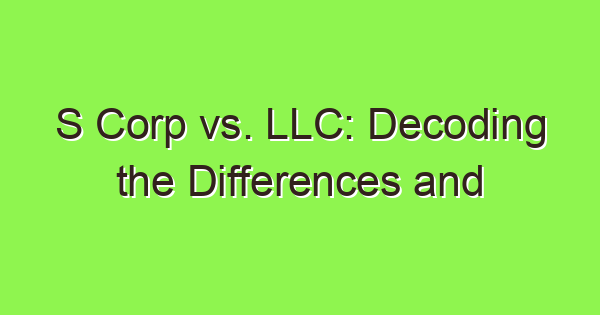S Corp vs. LLC: Decoding the Differences and Choosing Wisely

Starting a small business in the United States involves making critical decisions, and one of the most crucial choices is selecting the right business structure.
For many entrepreneurs, the decision often boils down to choosing between an S Corporation (S Corp) and a Limited Liability Company (LLC). In this article, we’ll delve into the key distinctions between these two entities and provide guidance on how to make an informed decision tailored to the unique needs of small business owners.
Understanding the Basics:
a. S Corporation (S Corp):
- A type of corporation that passes income, losses, deductions, and credits through to its shareholders for federal tax purposes.
- Limited liability protection for shareholders.
- Restricted to 100 shareholders or less.
- Formal structure with a board of directors and specific operational requirements.
b. Limited Liability Company (LLC):
- A flexible form of business organization combining elements of partnerships and corporations.
- Offers limited liability protection for members.
- No restrictions on the number of members.
- Flexibility in management structure and profit distribution.
Tax Implications:
a. S Corp:
- Pass-through taxation, meaning profits and losses are reported on individual shareholders’ tax returns.
- Potential for tax savings through the avoidance of self-employment taxes on shareholder salaries.
b. LLC:
- Flexible taxation options: can be treated as a disregarded entity, partnership, or corporation for tax purposes.
- Pass-through taxation by default, but members can choose corporate taxation if beneficial.
Management and Structure:
a. S Corp:
- Formal management structure with a board of directors, officers, and shareholders.
- Stricter operational requirements, such as regular meetings and record-keeping.
b. LLC:
- Flexible management structure, with members or managers handling day-to-day operations.
- Fewer formalities and paperwork requirements compared to an S Corp.
Compliance and Formalities:
a. S Corp:
- Strict compliance with state laws and regulations.
- Ongoing record-keeping and documentation requirements.
b. LLC:
- Generally more relaxed compliance requirements compared to an S Corp.
- Flexibility in operating agreements and management arrangements.
Choosing the Right Structure for Your Small Business:
Making the decision between an S Corporation (S Corp) and a Limited Liability Company (LLC) requires a thoughtful analysis of various factors. Consider the following key elements in the decision-making process:
A. Ownership Structure and Preferences:
- Number of Owners: Evaluate the number of individuals involved in your business. S Corps are limited to 100 shareholders, while LLCs can have an unlimited number of members. Consider the size and diversity of your ownership group.
- Types of Owners: Differentiate between individual owners, corporate entities, and foreign ownership. S Corps has restrictions on certain types of shareholders, while LLCs offer greater flexibility in terms of ownership.
B. Tax Considerations and Implications:
- Tax Treatment: Examine the tax implications for both S Corps and LLCs. S Corps follows a pass-through taxation model, while LLCs default to pass-through taxation but offer flexibility to choose corporate taxation if advantageous.
- Tax Savings: Consider the potential tax savings associated with each structure. S Corps may offer savings on self-employment taxes through reasonable shareholder salaries, while LLCs provide flexibility in profit distribution and taxation.
C. Operational Flexibility and Formality:
- Management Structure: Assess your preferred management style. S Corps have a formal structure with a board of directors, officers, and shareholders, while LLCs offer a more flexible management structure, allowing members or managers to handle day-to-day operations.
- Formality Requirements: Consider the level of formality your business requires. S Corps have stricter operational requirements, including regular meetings and specific record-keeping, whereas LLCs generally have fewer formalities.
D. Compliance and Record-Keeping Requirements:
- Compliance with State Laws: Understand the compliance requirements imposed by state laws for both S Corps and LLCs. S Corps often have more stringent state law compliance requirements.
- Ongoing Record-Keeping: Evaluate your willingness and capacity for ongoing record-keeping. S Corps typically require meticulous record-keeping and documentation, while LLCs have fewer formalities.
By carefully weighing these factors, you can tailor your choice of business structure to align with the unique needs and goals of your small business. Seeking professional advice, such as consulting with a qualified accountant or business advisor, can provide valuable insights and ensure that your decision aligns with both your immediate requirements and long-term vision.
Conclusion:
In the intricate landscape of small business ownership, the choice between an S Corp and an LLC can significantly impact your business’s success. Understanding the nuances of each structure and aligning them with your specific needs is paramount. Whether seeking the simplicity of an LLC or the formality of an S Corp, the decision should reflect your business goals, ownership preferences, and long-term vision.
As you embark on this critical decision-making journey, remember that professional advice tailored to your unique situation is invaluable. Consulting with a qualified accountant or business advisor can provide the personalized guidance needed to ensure your choice aligns seamlessly with your small business aspirations.
In the end, the path you choose will shape your business’s trajectory. So, which structure aligns best with your entrepreneurial vision and goals?


